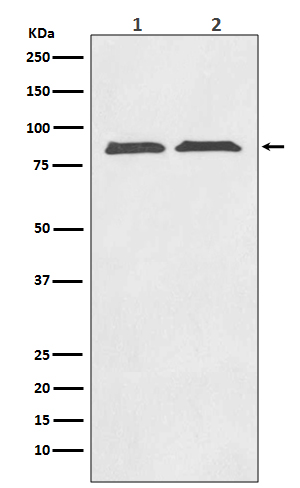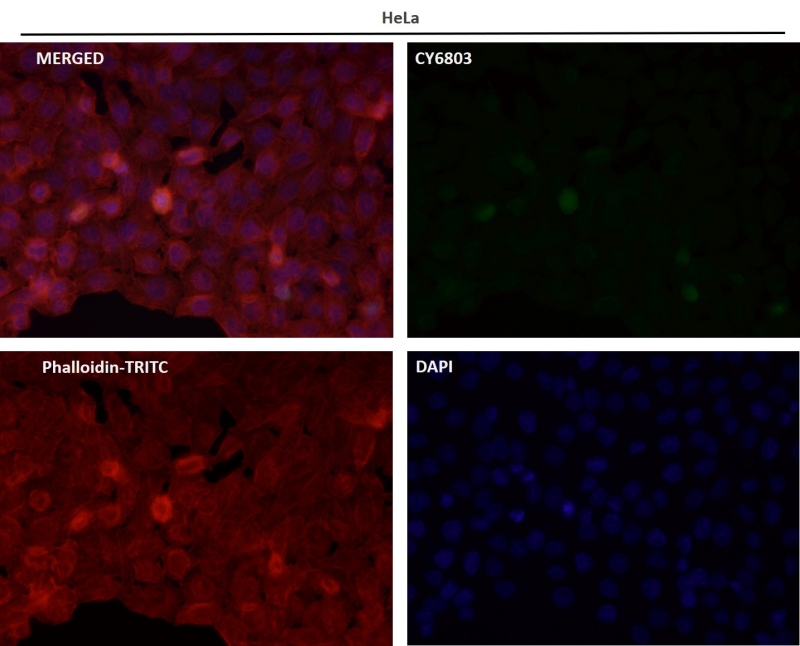

| WB | 咨询技术 | Human,Mouse,Rat |
| IF | 咨询技术 | Human,Mouse,Rat |
| IHC | IHC:1/100-1/200;IHF:1/50-1/200 | Human,Mouse,Rat |
| ICC | 1/50-1/200 | Human,Mouse,Rat |
| FCM | 咨询技术 | Human,Mouse,Rat |
| Elisa | 咨询技术 | Human,Mouse,Rat |
| Aliases | Axil; Axin like protein; Axin2; Axis inhibition protein 2; Conductin;;Axin 2 |
| WB Predicted band size | 94 kDa |
| Host/Isotype | Rabbit IgG |
| Antibody Type | Primary antibody |
| Storage | Store at 4°C short term. Aliquot and store at -20°C long term. Avoid freeze/thaw cycles. |
| Species Reactivity | Human,Mouse,Rat |
| Immunogen | A synthesized peptide derived from human Axin 2 |
| Formulation | Purified antibody in PBS with 0.05% sodium azide,0.05% BSA and 50% glycerol. |
+ +
以下是关于Axin2抗体的3篇参考文献示例(信息基于公开研究整理,具体引用时请核对原文):
1. **文献名称**: *Axin2 is a target of the β-catenin/TCF pathway in melanoma and promotes cancer cell proliferation*
**作者**: Jho EH et al.
**摘要**: 该研究通过Axin2抗体(Western blot和免疫荧光)验证Axin2在黑色素瘤细胞中受Wnt/β-catenin信号通路的调控,并揭示其通过促进细胞周期蛋白表达驱动肿瘤增殖的机制。
2. **文献名称**: *Axin2 expression identifies colorectal cancer stem cells and predicts recurrence after chemotherapy*
**作者**: Lustig B et al.
**摘要**: 利用Axin2抗体(免疫组化)在结直肠癌组织中标记Axin2阳性细胞,发现其具有干细胞特性,且高表达Axin2的患者术后化疗复发风险显著升高。
3. **文献名称**: *Axin2-dependent regulation of adult hippocampal neurogenesis by Wnt signaling*
**作者**: Kuwabara T et al.
**摘要**: 研究通过Axin2抗体(免疫染色)定位小鼠海马区神经干细胞中的Axin2蛋白,证实Wnt信号通过抑制Axin2维持神经干细胞的自我更新能力。
**提示**:建议通过PubMed或Google Scholar检索最新文献,并关注抗体验证方法(如敲除实验、多克隆/单克隆抗体来源),以确保研究可靠性。
The Axin2 antibody is a crucial tool in studying the Wnt/β-catenin signaling pathway, a conserved pathway regulating embryonic development, tissue homeostasis, and cancer. Axin2 (Axis inhibition protein 2) acts as a scaffold protein in the β-catenin destruction complex, facilitating phosphorylation and degradation of β-catenin. Unlike its homolog Axin1. Axin2 is itself a transcriptional target of Wnt signaling, forming a negative feedback loop to limit pathway activity. This dual role makes it both a biomarker and modulator of Wnt pathway activation.
Antibodies targeting Axin2 are widely used to detect its expression in research models (e.g., Western blot, immunohistochemistry, immunofluorescence) to assess Wnt pathway status. They help investigate Axin2's involvement in cancers (e.g., colorectal, hepatocellular carcinomas), where its overexpression often correlates with poor prognosis, and in tissue regeneration processes (e.g., intestinal stem cell maintenance, bone formation). Some antibodies distinguish between phosphorylated/non-phosphorylated forms to study post-translational regulation.
Commercial Axin2 antibodies are typically raised against specific epitopes (human, mouse, or rat), with validation in knockout controls being critical for specificity. Applications span developmental biology (embryonic patterning), cancer research (tumorigenesis mechanisms), and regenerative medicine (stem cell dynamics). Recent studies also explore its diagnostic potential as a liquid biopsy biomarker for Wnt-driven diseases.
×